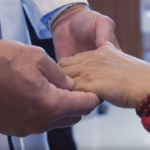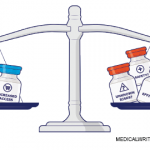In a new study, Baker et al. examined reference product and biosimilar orders, comparing data from a Veterans Affairs Medical Center (VAMC) to those from an academic medical center…

Research Beyond COVID-19: Collateral Damage
COVID-19 has generated an outpouring of fast-paced, late-breaking new developments. The majority of countries (188) around the world have reported cases of COVID-19.1 As of April 1, 2020, the Centers for Disease Control and Prevention had reported cases in every U.S. jurisdiction (50 states, District of Columbia, Puerto Rico, Guam, the Northern Mariana Islands and…

More Money, More Research: Foundation Report Sheds Light on Funding Gaps
The ACR and Rheumatology Research Foundation hope a new report on rheumatic disease research can leverage more money for ACR members, funding future research…

Foundation’s Award Provides Research Opportunity for Community-Based Practitioners
Rheumatologists in community-based practices work closely with patients, which allows them to notice trends and nuances researchers may not. Unfortunately, few opportunities exist for rheumatologists to test their observations through research, in addition to taking care of patients. Limited funding, time constraints and competition from larger academic medical centers are some of the barriers that…

Age-Related Blood Pressue Patterns in Lupus
Rheumatologists should not be falsely reassured by a normal mean blood pressure in lupus patients, according to a study from Johns Hopkins University that found age-related blood pressure patterns in systemic lupus erythematosus (SLE) differ from the general population and that increased diastolic blood pressure variability (BPV) is highly associated with cardiovascular events in SLE.1…

Biosimilars Are Slowly Climbing Toward Acceptance in Rheumatology
As useful stand-ins for biologics targeting a range of inflammatory diseases, biosimilars have made significant inroads across Europe as less expensive alternatives. Denmark, for example, realized a cost savings of 64% after instituting a mandatory national switch from the originator infliximab to its biosimilar counterpart. In the U.S., however, a considerably smaller fraction of rheumatologists…
Influential Lancet Article on HCQ Retracted
NEW YORK, June 4 (Reuters)—Three of the authors of an influential article that found hydroxychloroquine (HCQ) increased the risk of death in COVID-19 patients retracted the study, citing concerns about the quality of the data behind it. The anti-malarial drug has been controversial in part due to support from U.S. President Donald Trump, as well…
Are ANAs More Prevalent in the U.S. Now Than in the Past?
According to a new study, the prevalence of anti-nuclear antibodies (ANAs), the most common biomarker of autoimmunity in the U.S., has increased considerably in recent years among adolescents aged 12–19 years, in both sexes (especially in men), older adults (age ≥50 years) and non-Hispanic whites…

Researchers Discuss Viability of Rheumatology Education During the COVID‐19 Pandemic
In a matter of weeks, the COVID‑19 crisis has totally upended clinical medicine and the practice of rheumatology. Our old ways of seeing patients in person, precepting fellows in clinic or on the consult service, and leading in-person interactive teaching rounds are gone for now and possibly for good. But how can we replace these…

Studies Suggest Similar Risks for Biologics vs. Conventional Therapies for Rheumatoid Arthritis
Two new studies delving into the relative safety of biologic drugs prescribed for rheumatoid arthritis (RA) have concluded that real-world applications of abatacept and tumor necrosis factor inhibitors (TNFi’s) are comparable to more conventional therapies in their associated risk of serious infections. Triple Therapy One study, in Arthritis Care & Research, found the risk of…
- « Previous Page
- 1
- …
- 18
- 19
- 20
- 21
- 22
- …
- 125
- Next Page »